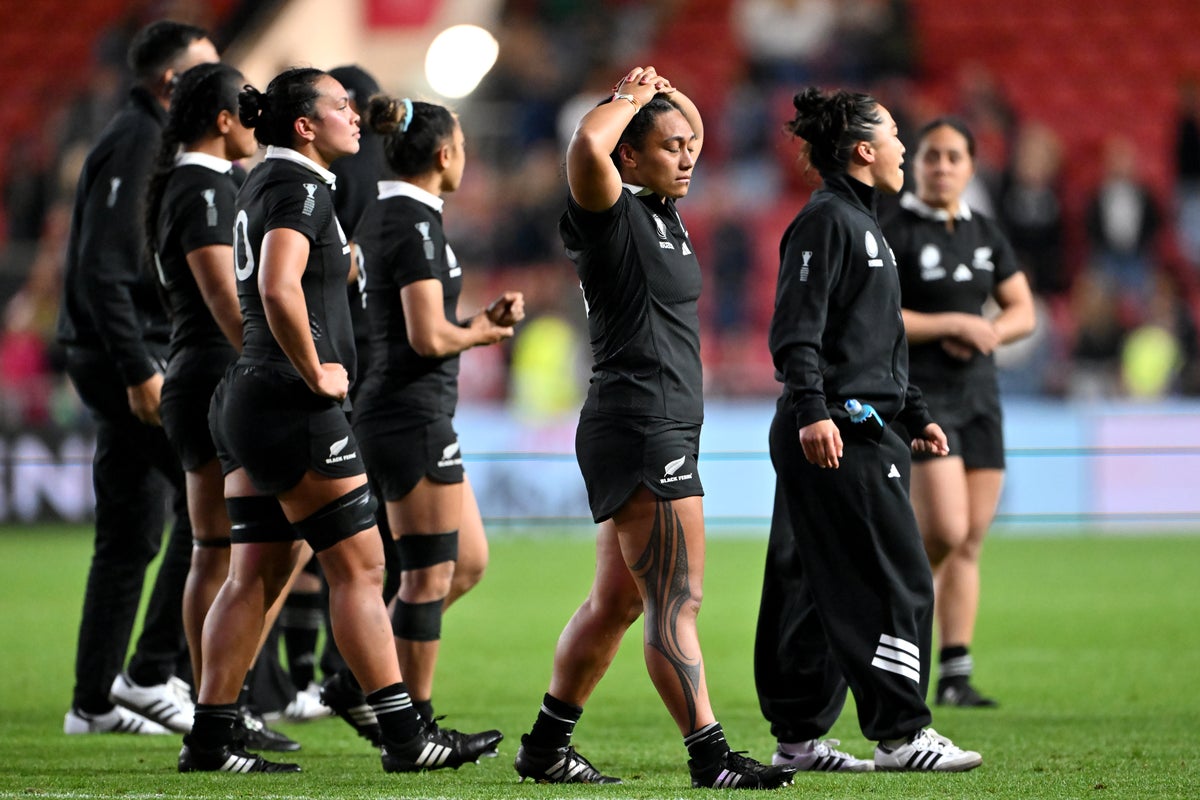Sat side-by-side at Ashton Gate, Kennedy Tukuafu and Allan Bunting wore haunted expressions and empty eyes as they attempted to process the despair of defeat. The Black Ferns aren’t much used to losing; certainly not at World Cups, where their remarkable record had read eight tournaments entered, six tournaments won.
Make that nine and six. “I’m gutted,” co-captain Tukuafu began, fighting back tears with head coach Bunting just as emotional beside her. “This is not how I envisaged our journey ending.” A third-place play-off may be still to come but for a side so used to finals, that will also be punishment in itself.
The assumed truth of women’s rugby is that the Black Ferns, regardless of circumstance or situation, will always find a way come the World Cup. It has not much mattered how New Zealand’s form has bene in the years leading up to the major tournament in the past, because they always find their groove when it matters. In 2021, the Red Roses thrashed the Black Ferns in back-to-back meetings by a combined score of 99-27; a year later, it was the hosts lifting the trophy at Eden Park.
The question now is whether that success was truly capitalised upon. While England’s Rugby Football Union (RFU) has worked hard to put the pieces in place to enable the growth seen in this World Cup to be sustained, almost regardless of whether they win it, evidence of a home tournament triumph catalysing the women’s game in New Zealand is a little harder to find.
There are some who felt that 2022 success papered over a few cracks in a programme that had been under severe scrutiny. In April of that year, of course, coach Glenn Moore had stepped down following what he described as “misleading allegations” made against him by hooker Te Kura Ngata-Aerengamate. While Wayne Smith and a collection of some of the best coaching talent in New Zealand combined to lift the side, the stable foundations for sustained success were not really built – Smith soon departed, to be replaced by Bunting after the former sevens coach had led the nation to Olympic gold at Tokyo 2020.
What is increasingly clear at this World Cup is the importance of playing time in developing both the strength and depth required to compete. It cannot be stated enough how crucial the Premiership Women’s Rugby (PWR) has been to the Red Roses; and, indeed, Canada, with much of their squad playing a full, 18-game season in the English top flight. While New Zealand have expanded Super Rugby Aupiki in the last couple of years, the season extends to only six games between four sides, and a grand final at the end of it. The difference in playing opportunities on offer are stark.
Where most nations organised warm-up fixtures ahead of the World Cup, it is fair to question whether the Black Ferns prepared properly. Entering the tournament, Bunting’s side had played only four games, a win over Australia to secure the Laurie O’Reilly Cup in July their last outing; compare and contrast with Canada, who took on South Africa a two-match tour and organised tough tests against the USA and Ireland in addition to their Pacific Four Series exertions.
Perhaps the hardening of those battles showed; certainly there was a difference between a shrewd, razor sharp Canadian collective and a Black Ferns side badly let down by their discipline and decision-making at times. It seemed to take New Zealand an age to go to their kicking game both to win territory and test a Canada defence that was keeping as many bodies on feet in the line as possible – fly half Ruahei Demant got some joy with little chips and varied kicking in the second half, but it was too little, too late.
“Canada were really clinical,” centre Stacey Waaka reflected. “We knew that they were going to pick-and-go. We knew that they were hunting around our breakdown. That’s probably been a weakness for us, but happy for them. They obviously exploited us in that area, we weren’t fronting up. We’re probably a bit narrow in our defence at times, so sometimes we thought they were going to do a pick-and-go and they went out wide.”
Clearly all is not lost for New Zealand. In Braxton Sorensen-McGee – now with nine tries from five games at her debut World Cup – they have unearthed a young wing somehow capable of filling the boots of Portia Woodman-Wickliffe, who goes back into retirement with a record try tally. They sorely missed openside Jorja Miller in the semi-final; already a sevens star, it would probably benefit the Black Ferns in the long run to keep the flanker in 15s as much as possible, even if the shorter format has aided the development of plenty of the squad.
The revamped WXV Global Series at least ensures consistency of competition in the September/October window, with an expectation that New Zealand will now host European nations much more often on home soil – providing a better gauge of their progress. “I think we need to make sure we capitalise on this momentum,” Tukuafu stressed. “This is the biggest Rugby World Cup that there has been. With that, we need to make sure that however many games or exposure we get, we are making an impact on future Black Ferns.”

